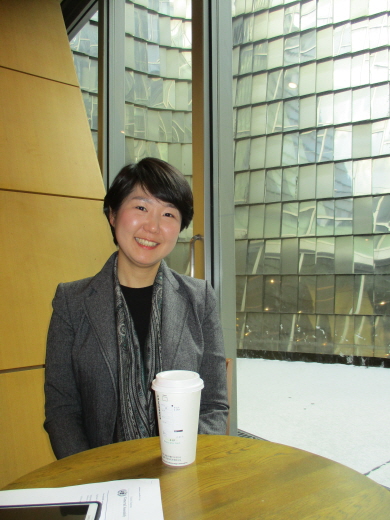
Ever since Korea joined the OECD Development Assistance Committee in 2010 after being a recipient country for more than forty years, the field of development cooperation has become increasingly important in the country. Since then, the Korean government has more than tripled its aid to developing nations as a member of the international forum of aid donors.
Korea International Cooperation Agency (KOICA) is in charge of implementing government aid programs. In order to start an aid program, research on the type of aid and its potential effectiveness is necessary. Such research is just a part of the work done by researcher Kim Ji-hyun of KOICA’s Research and Development Office; Kim devises strategies for the programs by following the updates of international committees such as the United Nations and the OECD.
Every day, Kim collects news and comments regarding donor countries and the international community to find out what KOICA can do for developing countries. Also, when planning development assistance projects, she takes a culture-specific approach by referring to her own manual on recipient countries.
“While working in the development cooperation field for seven years, I was able to collect large amounts of data on the cultures of recipient countries,” Kim revealed. “They have now become my manual, helping me figure out the type of assistance that is suitable for a specific culture.”
By using her own manual and information from the news, Kim carries out multiple researches simultaneously. This year, she is scheduled to conduct four research projects that range from one to eight months. She will also collaborate with the United Nations University World Institute for Development Economics Research, a foreign research institute that specializes in international development.
Nowadays, Kim works day and night conducting research on the Sustainable Development Goals (SDGs) set by the UN in 2015. The 17 SDGs include fighting against climate change and ensuring sustainable consumption patterns, and all UN member nations including Korea are expected to reach the goals in the next 15 years.
However, the Korean government has not yet established an implementation system necessary to reach the SDGs. Thus, Kim has attended domestic conferences and has communicated with foreign decision makers to figure out specific methods to accomplish them. Although many Koreans do not realize the importance of SDGs, she silently works as the head Korean researcher of an agenda that will be the international norm of the UN for the next 15 years.
“Although a lot of research still needs to be done on Korea’s implementation of the SDGs, I feel fortunate to work at a time of change,” Kim said. “Also, finding a link between universal issues and Korea’s role in the international community is meaningful.”
More than the workload itself, Kim revealed that the negative views toward international development cooperation was a challenge. In fact, when she first revealed her passion in development cooperation, her family understood neither her career path nor reasons for Korea’s provision of international assistance.
“Unlike traditional donors that have a long history of development assistance, Korea started assisting other nations without a social consensus,” Kim explained. “This is why many Koreans are against government participation in development cooperation.”
Despite the opposition, Kim stated that Korea should engage in development cooperation for national interest, humanitarian reasons, and Koreans’ responsibility as global citizens.
“Similar to how companies attract customers by practicing corporate social responsibility, the global society will have a better image of Korea if the nation reaches out to countries in need,” she said. “Since inequality is a threat to social security, development cooperation is necessary, even from a humanitarian perspective.”
Researcher Kim’s interest in humanitarian issues began when she participated in a Model United Nations conference during her junior year at Ewha. Despite majoring in political science and international relations, she was unaware of various international issues at the time. However, she became interested in international matters through participating in the event.
Her interest in universal issues led her to pursue a master’s degree in international security in the United States. After returning to Korea, she worked at the international cooperation division of the Science and Technology Policy Institute. While working at the institute, she realized that international cooperation was seen as a minor issue among the global community and Korean citizens. She wanted to bring the issue into the mainstream, hence completing her doctorate degree in the field of international cooperation.
Kim remarked that Koreans are fortunately becoming more positive about the country’s engagement in development cooperation. Now that she has become a KOICA researcher, her next goal is to generate diverse national policies and strategies that are grounded on her research.
“I am not a decision maker,” she admitted. “As a researcher, my goal is to conduct research that will contribute to KOICA’s decision-making process.”
Lastly, when asked to give advice to aspiring international development cooperation experts, Kim emphasized developing one’s own expertise.
“You do not need to major in Political Science or Economy to work in this field,” Kim said. “A Social Work or Medicine major with a development cooperation perspective can provide a different viewpoint that is necessary in the field.”

